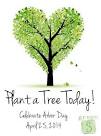
With Arbor Day coming up, it is fitting to think about the value of trees whether they are the favorite maples in your backyard, the windbreak on the farm or the great forests of the Pacific Northwest. No one has more eloquently put into words the value of trees than President Theodore Roosevelt as he addressed the school children of the United States on April 15, 1907:
Arbor Day (which means simply “Tree Day”) is now observed in every State in our Union — and mainly in the schools. At various times from January to December, but chiefly in this month of April, you give a day or part of a day to special exercises and perhaps to actual tree planting, in recognition of the importance of trees to us as a Nation, and of what they yield in adornment, comfort, and useful products to the communities in which you live.
It is well that you should celebrate your Arbor Day thoughtfully, for within your lifetime the Nation’s need of trees will become serious. We of an elder generation can get along with what we have, though with growing hardship; but in your full manhood and womanhood you will want what nature once so bountifully supplied and man so thoughtlessly destroyed; and because of that want, you will reproach us, not for what we have used, but for what we have wasted.

For the Nation as for the man or woman and the boy or girl, the road to success is the right use of what we have and the improvement of present opportunity. If you neglect to prepare yourselves now for the duties and responsibilities which will fall upon you later, if you do not learn the things which you will need to know when your school days are over, you will suffer the consequences. So any nation which in its youth lives only for the day, reaps without sowing, and consumes without husbanding, must expect the penalty of the prodigal, whose labor could with difficulty find him the bare means of life.
A people without children would face a hopeless future; a country without trees is almost as hopeless; forests which are so used that they cannot renew themselves will soon vanish, and with them all their benefits. A true forest is not merely a storehouse full of wood, but, as it were, a factory of wood, and at the same time a reservoir of water. When you help to preserve our forests or to pla nt new ones you are acting the part of good citizens. The value of forestry deserves, therefore, to be taught in the schools, which aim to make good citizens of you. If your Arbor Day exercises help you to realize what benefits each one of you receives from the forests, and how by your assistance these benefits may continue, they will serve a good end.
nt new ones you are acting the part of good citizens. The value of forestry deserves, therefore, to be taught in the schools, which aim to make good citizens of you. If your Arbor Day exercises help you to realize what benefits each one of you receives from the forests, and how by your assistance these benefits may continue, they will serve a good end.
THEODORE ROOSEVELT